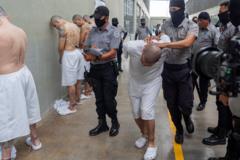In a move that has drawn legal scrutiny and mixed reactions, the US has deported 17 alleged gang members to El Salvador, part of an ongoing effort to combat organized crime. The Secretary of State highlighted serious criminal backgrounds among the deportees, while El Salvador's President released edited footage of their arrival.
US Continues Deportation of Alleged Gang Members to El Salvador Amid Legal Controversies

US Continues Deportation of Alleged Gang Members to El Salvador Amid Legal Controversies
The Trump administration has deported 17 more alleged gang members to El Salvador, despite recent legal challenges surrounding these operations.
The Trump administration executed the deportation of 17 alleged gang members to El Salvador on Monday, as reported by the US state department. This decision comes in the face of ongoing legal struggles related to the deportation practices used against migrants under the Alien Enemies Act, a law first enacted in 1798.
US Secretary of State Marco Rubio noted that those deported include members of notorious gangs such as Tren de Aragua and MS-13. Salvadoran officials indicated that the deportees comprised both Venezuelan and Salvadoran nationals.
Recent legal challenges led a court to pause the deportations under the Alien Enemies Act, claiming it was invoked improperly, as it has traditionally been applied during wartime. It remains uncertain what legal grounds were used for the latest deportations. In Rubio’s statement, he labeled the group as "murderers and rapists," but did not disclose specific identities, alleged crimes, or prior convictions of the individuals involved.
El Salvador's President, Nayib Bukele, posted a heavily edited video on social media that showed men being processed into the prison system, emphasizing their criminal histories without revealing individual names or details. "All individuals are confirmed murderers and high-profile offenders, including six child rapists," he claimed, framing the operation as a significant move against terrorism and organized crime.
The agreement to accept these deportees has also come with financial backing; the US provided $6 million to El Salvador in exchange for taking in deportees. According to family members of previously deported individuals, some of those sent to the maximum-security prison deny any affiliation with gang activities.
The backdrop of legal disputes began earlier this month when deportation flights for over 100 Venezuelans were conducted, igniting challenges from legal advocacy groups like the American Civil Liberties Union and Democracy Forward, who argue that due process was denied to those deported.
On April 15, in a ruling by federal judge James Boasberg in Washington DC, a temporary restraining order was issued against the use of the Alien Enemies Act. Despite this, deportation operations persisted, and another court hearing is scheduled to take place on Thursday, amid mounting pressure on the administration's actions surrounding deportation practices.




















